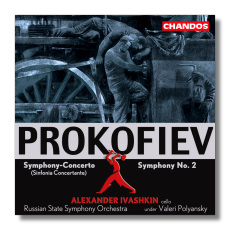
The Internet's Premier Classical Music Source
Related Links
- Prokofieff Reviews
- Latest Reviews
- More Reviews
-
By Composer
-
Collections
DVD & Blu-ray
Books
Concert Reviews
Articles/Interviews
Software
Audio
Search Amazon
Recommended Links
Site News
 CD Review
CD Review
Serge Prokofieff

- Symphony #2, Op. 40
- Symphony-Concerto for Cello and Orchestra, Op. 125
Alexander Ivashkin, Cello
Russian State Symphony Orchestra/Valery Gergiev
Chandos CHAN9989
The Prokofieff Second Symphony has been getting some long overdue attention of late, appearing on a few major orchestra-concert programs throughout the United States and Europe in the last year or so and on some recordings. It is usually recorded only in symphony cycles, though Leonid Grin, and before him Erich Leinsdorf and Charles Bruck (the French conductor who led the first performances and recording of Prokofieff's The Fiery Angel in the mid-1950s) recorded it separately. It is generally considered a tough nut to crack, though to my ears it is a well-constructed, extremely imaginative work of profound character. It must share honors with the tragic Sixth as Prokofieff's greatest symphonies, leaving the brilliant Fifth somewhat in the dust. But, of course, the Second's dissonance and complexity have militated against its popularity, thus curtailing performances and recordings.
Here, Polyansky is given about the best sound reproduction the symphony has yet enjoyed and his orchestra isn't bad, either. Moreover, his first movement, apart from a messy climax to his development section, where a critical motif is buried under a barrage of brass and percussion sonorities, is quite compelling and well-played. The second movement, too, is, for the most, incisively-interpreted and -played. But there is one major failing here: in some sort of angst-seeking spirit, Polyansky takes the final, and most powerful variation of the six, at such an incredibly slow speed, as to rival the January-molasses tempo of Bernstein's Tchaikovsky Sixth finale. It doesn't work – everything has a slow-motion manner about it; the ethereal atmosphere is lost, and those stomping chords at the work's climax sound sluggish and almost drunken. Stick with Kuchar (Naxos), Ozawa (DG), Järvi (Chandos) or, if you can find it, Weller (Decca).
But Ivashkin redeems this CD, turning in a performance of the Symphony-Concerto to rank with the best. It is hard, of course, to take on Rostropovich in his efforts (with Sergeant and Ozawa, in particular), but he does quite successfully. And he surpasses Ma, Schiff, Wallfisch and others, too. Ivashkin plays with accurate intonation and a sense for passion: he's a committed player who believes in the music, finding meaning and drama behind the notes in unexpected places – try his pizzicato chords and other passage work leading to the return of the main theme in the first movement. In the end, it is Ivashkin who makes purchase of this CD worthwhile. By the way, his notes on both works are quite informative. Excellent sound in the Symphony-Concerto, too.
Copyright © 2002, Robert Cummings


















